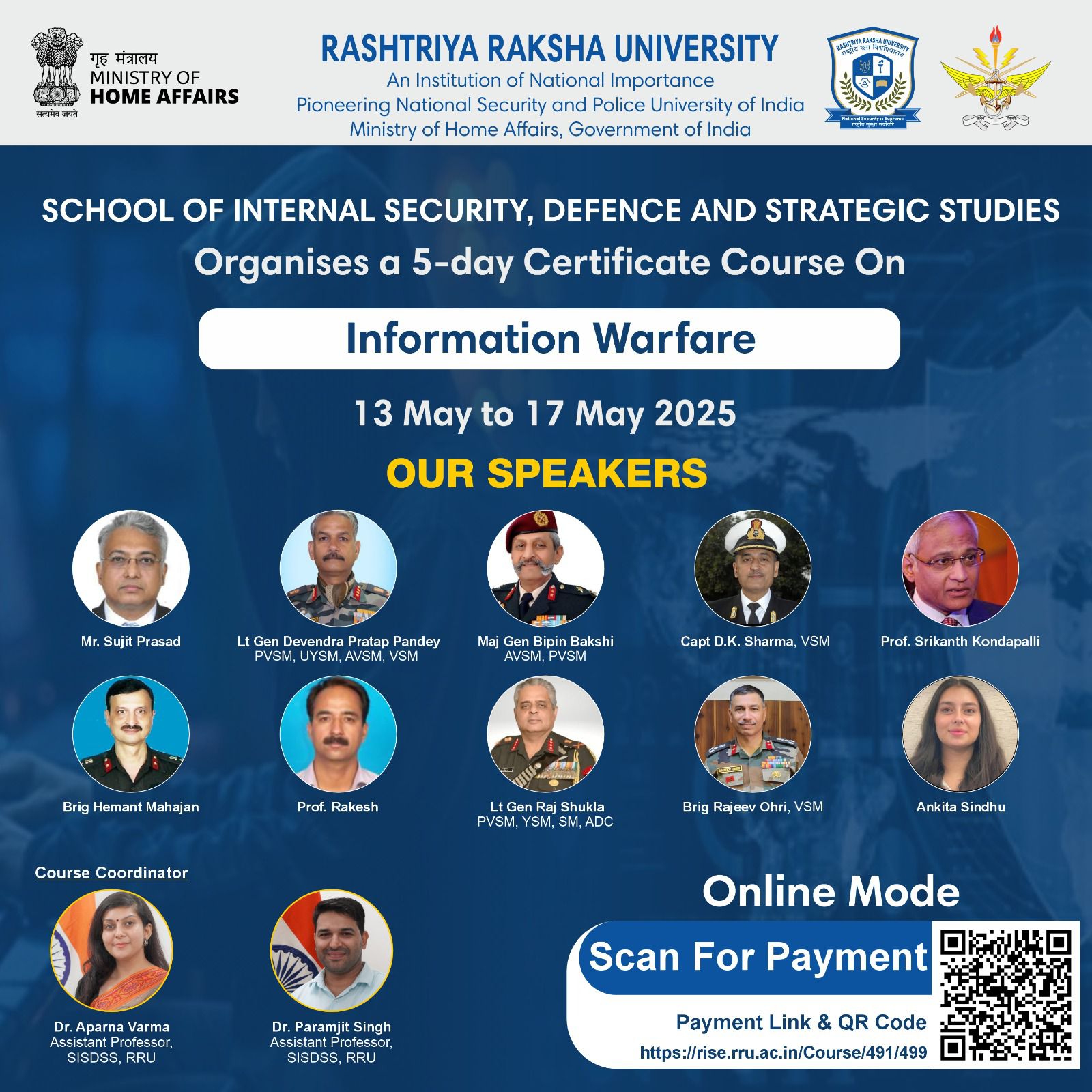
Description
Information Warfare is a critical and pivotal aspect of the conduct of war. Right intelligence is essential to wage a war, especially in asymmetry between countries. Information Warfare has shaped warfare, societies, and global geo-politics. As we navigate the complexities of geopolitics and evolving military technologies, it is essential that we critically examine the nature, impact, and consequences of warfare. Advancements in Information technologies in this modern age have resulted in multifarious means of information collection, offensive and cyber network exploitation, information deception, and social media use to disseminate propaganda and misinformation.
Information Warfare (IW) includes operations/activities to achieve dominance by gathering information on the enemy while denying a similar advantage to the enemy. It is also aimed at subverting the enemy without using Kinetic measures. Elements of Information Warfare remain contested- Some scholars categorize Electronic Warfare (EW), Cyber Warfare (CW), and psychological warfare/cognitive warfare as components of Information Warfare (IW), while others view them as distinct domains. However, the utility of these components is critical in the successful execution of the IW.
Information Warfare in the Russia- Ukraine war and Israel- Palestine conflict highlights the importance of the role of IW in Command and Control (C2) structures and the Observe, Orient, Decide, and Act (OODA) loop within the joint warfighting structures. The world stands at the crossroads of fifth-generation warfare, and militaries across the world are evolving from joint operations to Multi-Domain Integrated joint operations and all-domain operations. In the evolving warfighting concepts of integrated joint warfare and C6ISR (Command, Control, Communications, Computers, Cyber, Intelligence, Surveillance, and Reconnaissance), emphasis is on information supremacy in warfare. The role of IW cannot be overstated in shaping the outcomes of any conflict. IW started as a supplementary form of warfare, but it appears it is likely to dominate future wars as a core component of any warfare. Various militaries across the world have adapted their force structures and doctrines to accommodate and operationalise IW operations. Information has become a domain of war just as land, air, sea, cyber, and space. Countries like China and the US are planning and streamlining their force structures and defining their goals and aims in the IW domain. Lines of IW are blurred; IW is percolating down to the tactical level with the same intensity as at the strategic level
Comprehensive national power (CNP) and the whole of nation approach (WONA) are key concepts that define today’s geopolitics. Soft power, i.e., the ability to obtain preferred outcomes by attraction rather than coercion or payment, is a crucial element of WONA/CNP. Influence operations based on IW are essential for the success of Soft power. Perception management, influence operations, and soft power go hand in hand to ensure a favourable atmosphere for a nation at regional and strategic levels. The world today is in a state of flux marked by volatility, uncertainty, and instability. The battle of narratives has progressively become the order of the day, which may act as a hindrance in the rise and fall of the nations. This requires combating misinformation, disinformation, and malinformation through effective public communication. Thus, it is vital to understand what misinformation, disinformation, and propaganda are in the IW domain and how nations use them to their advantage. In a rapidly changing global landscape, the significance of strong and collaborative relationships between nations cannot be understated. Economic growth and progress are the cornerstones for rise in the international arena. Economic Information Warfare is the strategic use of IW to weaken adversarial economies. Countering IW is a tall order task for any nation, it requires self-reliance in IW processes, information collection, analysis, and then dissemination. Strategic communication strategies for internal and external actors are vital to ensure information superiority. Proxies, Terror groups, and other non-state actors are prompt in exploiting information and spreading fissiparous tendencies that have a detrimental effect on the nation. Exploitation of IW is a challenge to all democracies. Modern bureaucracies and businesses need a constant vigil to mitigate challenges posed against good governance. Cyber, AI, and Electronic warfare remain buzzwords for all major militaries. Cyber warfare generally refers to the use of cyberspace to target Computer networks, digital infrastructure, and systems. Electronic Warfare refers to the use of EW spectrum (radio waves) to detect, intercept, and jam adversarial communications and signals. The evolution of the Internet of Things (IoT), smart devices, AI, and automation are all linked and are now supplementing IW operations in all domains.
The use of information in wars is not a new phenomenon; IW has been used in all contemporary wars that India has fought since its independence. However, today, IW is operationalised. There is a need to analyse the IW campaign like the Kargil war and deduce key lessons for the future. The expanding Chinese footprint in India’s neighborhood and the Pak-China nexus pose a significant two-front threat to India; IW remains a crucial component for Pakistan and China in the conduct of shaping influence operations against India. Under the grey zone strategy, Pakistan and China continue to exploit information to undermine India both at regional and global levels. Disinformation, misinformation, and propaganda. There is an urgent need for a Comprehensive national approach to protect India’s digital and cyber infrastructure against cyberattacks by China and disinformation campaigns conducted by Pakistan.
It is to this effect that SISDSS is organising a 5-day certificate program of Information Warfare. It will analyse these issues both from an Indian and a global perspective. The program will also include speakers from a variety of backgrounds who will take part in this program. They will be both from a civilian and security background and will include scholars with specialisation in particular areas of Information warfare. Along with this, Stakeholders who have hands-on experience of information Warfare will also offer their valuable expertise through this program.
What you'll learn
To learn and understand what Information Planning is, its prominence, and strategic imperatives in Information Warfare.
Understand that information warfare recognizes communication strategy as an intrinsic component of a national strategy.
Develop the ability to formulate and implement effective communication strategies by identifying objectives, assessing the information landscape, and leveraging partnerships, both foreign and domestic.
To gain a comprehensive understanding of the role of information warfare in modern conflicts and its impact on national security.
Evaluate the effectiveness of different approaches, identify emerging trends, and assess their implications for global security.
To understand the concept of soft power strategies and its role in shaping public perception and policy formulation.
Comprehend the role of influence operations to manipulate public perception, shape narratives, achieve strategic objectives, and assess the impact of info ops on national security and public trust.
To familiarize with modern circumstances where abundant information is available and, under such conditions, the actions regarding selecting the right information at the right time to gain an edge in information warfare.
Gain a comprehensive understanding of communication strategies in the 21st-century operational environment, including their role in shaping narratives, influencing decision-making, and countering misinformation.
Analyse adversarial tactics, adapt to the evolving information environment, and enhance strategic communication capabilities to achieve national security and operational goals.
Analyse and compare the information warfare force structures of major powers, examining their organization, capabilities, and strategic objectives.
Develop a structured framework for comparative analysis to understand strengths, weaknesses, and evolving practices in information warfare.
To understand the difference between Misinformation, Disinformation, and Malinformation.
Requirements
Course Content
Semester with subjects
 No Semester Founds.
No Semester Founds.
Experts
Delhi based Naval officer, who found his calling as a 'Spokesperson & Public Relations Head' of Indian Navy and steered many a campaign to spread the word about the tremendous work being undertaken by our silent service ie Indian Navy (in the background away from public glare), whether be it in the times of crises or projecting the power of our indomitable force. Information Warfare a new concept which was getting into being (early 2010) because of the revolution in communication technology (proliferation of cheap smart phones) and advent of social media, was adopted for the first time, as a tool to promote and sensitise our own population about our Armed Forces. And there has been no looking back since then. Served in the India Navy with pride and elan for 34 years before superannuation in Aug 2019. Was awarded Visisht Sewa Medal in 2016 for his dedicated service to the nation. Presently, contributing as a Media Outreach and Business Development Consultant at BharatShakti.in besides being an Analyst and commentator on matters Maritme.
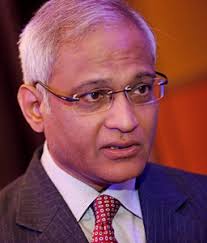
Prof Srikanth Kondapalli
Professor, Centre for East Asian Studies, School of International Studies, JNU
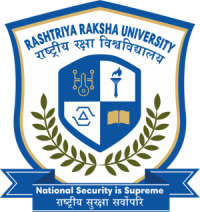
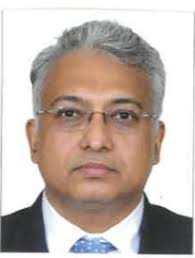
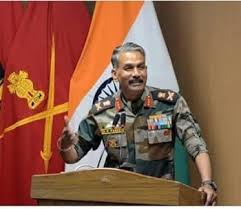
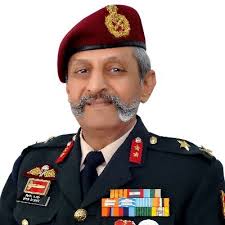
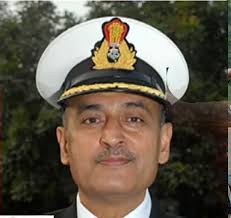
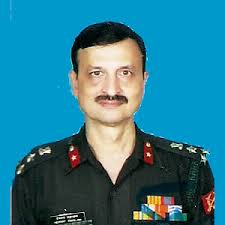

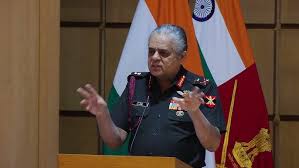
.jpg)

Mr. Rushikesh Pushpa Nandkumar Khose 10 May, 2025
🪔 ॐ नमश्शुक्रबृहस्पतिभ्याम् l
Good opportunity to know about Non conventional as well as 4th Generation Warfare. Today's world is unpredictable and uncertain for asymmetric war. Jai Hind 🇮🇳